Did you know that Yogyakarta is home to over 300 traditional dishes? From the iconic Gudeg to the tantalizing Bakpia, this vibrant city boasts a rich culinary heritage including restaurant, snack, and side dishes waiting for you to explore. Whether you’re dining at family-owned warungs or strolling through bustling markets, every corner of Yogyakarta offers an authentic taste of Indonesia‘s flavorful history and culture. Join us as we uncover the best spots where you can savor these beloved local delicacies and drinks. From savory street food stalls to cozy restaurants, get ready to embark on a gastronomic adventure unlike any other.
Traditional Flavors
Cultural Influences
Yogyakarta’s traditional dishes are heavily influenced by Javanese, Sundanese, and Chinese culinary traditions. The rich history of royal cuisine in Yogyakarta has also contributed to the diverse flavors found in local foods. For example, the use of local spices and herbs in the restaurant is a testament to the fusion of traditional and modern cooking techniques.
The Javanese influence can be seen in dishes like Gudeg, a popular jackfruit-based dish often served with rice. This sweet yet savory meal embodies the essence of Javanese cuisine. Sundanese influences bring forth an array of vegetable-based side dishes that complement main courses perfectly.
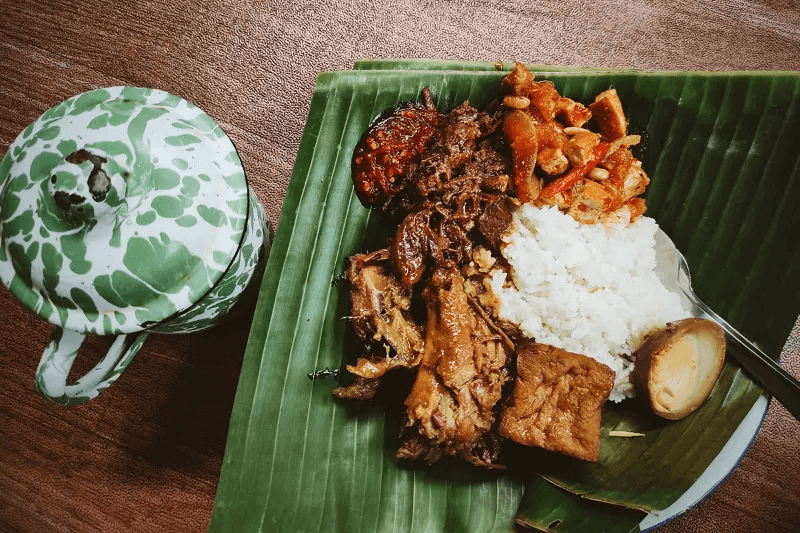
The Chinese culinary influence is evident in various street foods such as tofu-based snacks or stir-fried vegetables infused with oriental flavors. These cultural amalgamations have resulted in a wide range of traditional dishes that cater to different tastes while showcasing the region’s vibrant history through food.
Dining Etiquette
When dining in Yogyakarta, it’s essential to observe local dining etiquette as a sign of respect for the culture and its people. One key aspect is using your hands for eating certain traditional meals—a practice deeply rooted in Indonesian customs.
Another important gesture is leaving a small amount of food on your plate after finishing your meal; this signifies appreciation for the host’s generosity and ensures that you haven’t gone hungry during your visit. Furthermore, showing appreciation for local customs and manners demonstrates gratitude towards those who have prepared or served your meals.
Exploring Traditional Javanese Dishes
Signature Meals
When visiting Yogyakarta, you can’t miss indulging in the iconic Gudeg, a sweet jackfruit stew that perfectly balances sweet and savory flavors. This traditional Javanese dish is made from young jackfruit, coconut milk, palm sugar, and various spices. The tender texture of the jackfruit combined with the rich sauce makes it an absolute delight for your taste buds.
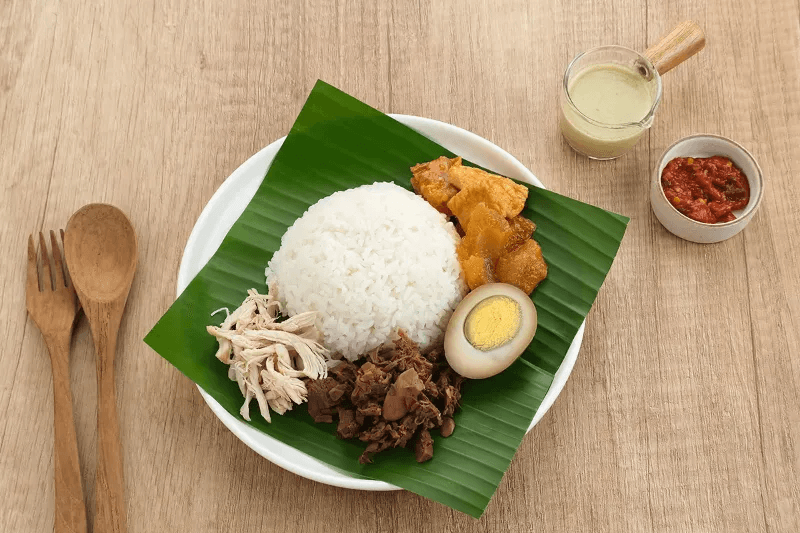
Another must-try dish is Ayam Goreng Kalasan, a flavorful fried chicken dish marinated with a blend of rich herbs and spices. The chicken is deep-fried until crispy on the outside while remaining tender and juicy inside. It’s often served with steamed rice or alongside other traditional side dishes.
For noodle enthusiasts, Bakmi Jawa offers a delightful exploration of traditional Javanese cuisine. This classic noodle dish features handmade noodles stir-fried with aromatic local spices, vegetables, and either chicken or beef. The result is a satisfying medley of textures and flavors unique to this region.
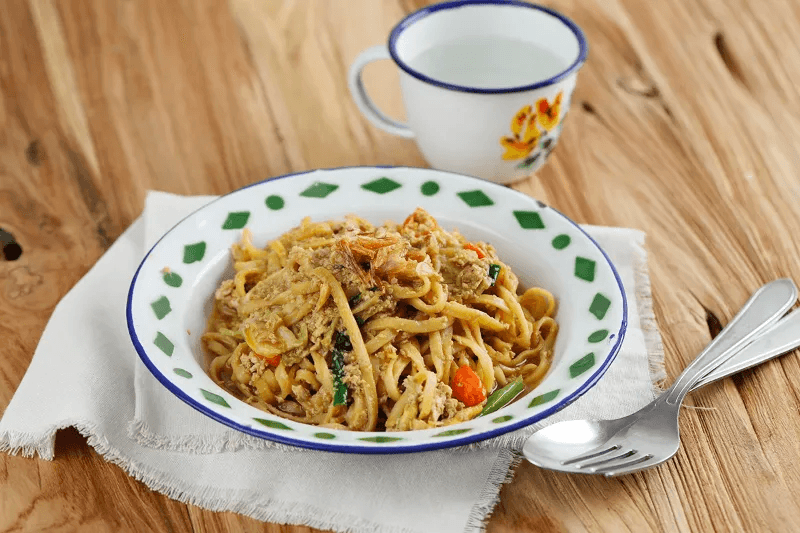
Vegetarian Delights
If you’re looking for vegetarian options, Yogyakarta has an array of delectable choices to offer. Sayur Lodeh stands out as a popular option—a coconut milk-based vegetable soup bursting with an assortment of fresh vegetables like cabbage, carrots, green beans, and tofu or tempeh.
Tahu Tek, another vegetarian gem in Javanese cuisine, presents itself as a refreshing salad featuring tofu cubes drizzled with peanut sauce accompanied by fresh bean sprouts and cucumbers. This light yet flavorful dish provides a perfect balance between creaminess from the peanut sauce and crispness from the vegetables.
Moreover,tempeh dishes are abundant in Central Java due to its significance as one of the staple ingredients in Indonesian cuisine. From crispy fried tempeh (tempeh goreng) to sweet soy-marinated tempeh (tempeh bacem), these dishes showcase the versatility of this beloved local soybean product.
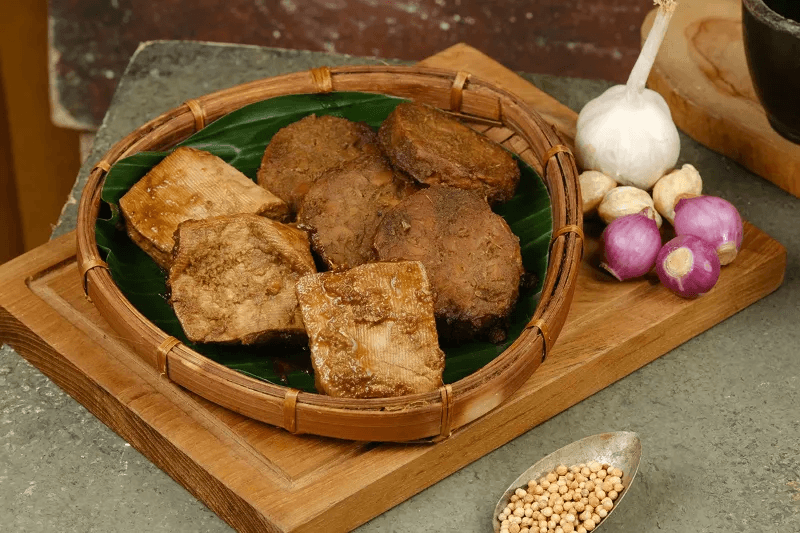
Night Market Specialties
Yogyakarta’s bustling night markets are renowned for their vibrant atmosphere teeming with diverse street food options.
Top Restaurants for Authentic Cuisine
Fine Dining
Several fine dining establishments offer an exquisite culinary journey. At these elegant venues located within luxury hotels and resorts, patrons can savor traditional dishes prepared with precision and finesse. The fusion of Indonesian flavors with international influences results in a unique gastronomic experience that showcases the diversity of Indonesian cuisine.

The impeccable service and sophisticated ambiance further elevate the dining experience, providing a perfect setting for enjoying authentic Javanese delicacies. These fine dining restaurants are renowned for their attention to detail and commitment to preserving the rich heritage of traditional Javanese cooking. Patrons can expect an extraordinary culinary adventure characterized by exceptional flavors, artful presentation, and unparalleled hospitality.
For example:
-
Hotel Tugu Yogyakarta offers an opulent dining atmosphere where guests can relish delectable renditions of classic Javanese dishes.
-
The Phoenix Hotel Yogyakarta presents an upscale dining experience featuring a blend of local ingredients and global culinary techniques.
Local Favorites
In addition to upscale establishments, exploring local favorites is essential for truly immersing oneself in the vibrant food culture of Yogyakarta. From humble street-side eateries to bustling markets, visitors can discover an array of beloved traditional dishes that have been cherished by locals for generations.

Soto Kadipiro is a popular turmeric-based chicken soup known for its comforting warmth and aromatic spices. This beloved dish exemplifies the heartwarming essence of Indonesian comfort food. Nasi Gudeg is another local favorite—a fragrant rice dish served with jackfruit curry, tender chicken or tofu, savory side dishes like krechek (spiced beef skin), fried cow skin crackers (gareng), all complemented by steamed rice wrapped in banana leaves.
Moreover:
-
Wedang Ronde offers a warm ginger drink accompanied by delightful glutinous rice balls—an ideal way to conclude a satisfying meal while embracing local beverage traditions.
-
Exploring these local favorites allows visitors to gain insight into everyday Indonesian cuisine beyond restaurant offerings.
Street Food Culture in Yogyakarta
Iconic Snacks
When exploring Yogyakarta’s street food scene, there are iconic snacks that one must try. Kipo cookies, filled with sweet coconut or palm sugar, offer a delightful blend of textures and flavors. Similarly, lupis, a sticky rice cake served with palm sugar syrup and grated coconut, provides a unique taste of traditional Javanese sweets.
Gemblong is another popular snack made from deep-fried glutinous rice flour balls coated in caramelized sugar. These iconic snacks represent the rich culinary heritage of Yogyakarta and are widely available across various street vendors throughout the city.
Unique Finds
In addition to these iconic snacks, there are several unique finds awaiting visitors in Yogyakarta. Es Dawet Ayu is a refreshing iced dessert featuring jelly noodles and coconut milk—a perfect treat for cooling off during warm days while exploring the city.

For those seeking more adventurous culinary experiences, Krecek Kulit Sapi offers spicy cow skin crackers often enjoyed as a snack. This distinctive dish showcases the diverse range of flavors found within Yogyakarta’s street food culture.
Moreover, tourists can also savor Kembang Waru tea made from the hibiscus flower—a local specialty that captures the essence of traditional beverages in Central Java. These unique finds contribute to an enriching exploration of Yogyakarta’s vibrant street food culture.
A Guide to Malioboro’s Dining Spots
Street Eats
When exploring Malioboro in Yogyakarta, visitors can embark on a delightful street food tour. The vibrant street is adorned with an array of street vendors offering beloved local delicacies. For instance, one can savor the rich flavors of bakso, a flavorful meatball soup, or indulge in succulent and skewered pieces of satay.

Those seeking an authentic culinary adventure can relish the iconic Javanese dish called gudeg, made from young jackfruit stewed in coconut milk and palm sugar. Furthermore, for a fulfilling meal, one can opt for fragrant and savory fried rice prepared by skilled street cooks along Malioboro’s bustling streets.
Moreover, while strolling through this lively area, tourists have the opportunity to sample various traditional snacks and desserts from charming street vendors. These delectable treats include sweet pastries like martabak telor – a luscious stuffed pancake that promises to tantalize taste buds.
Sit-down Meals
For individuals desiring a more leisurely dining experience amidst their exploration of Yogyakarta’s culinary landscape, several options await them. They could choose to visit quaint warung venues that specialize in serving authentic home-cooked Indonesian meals. This allows diners to savor dishes prepared with love and expertise within a cozy setting.
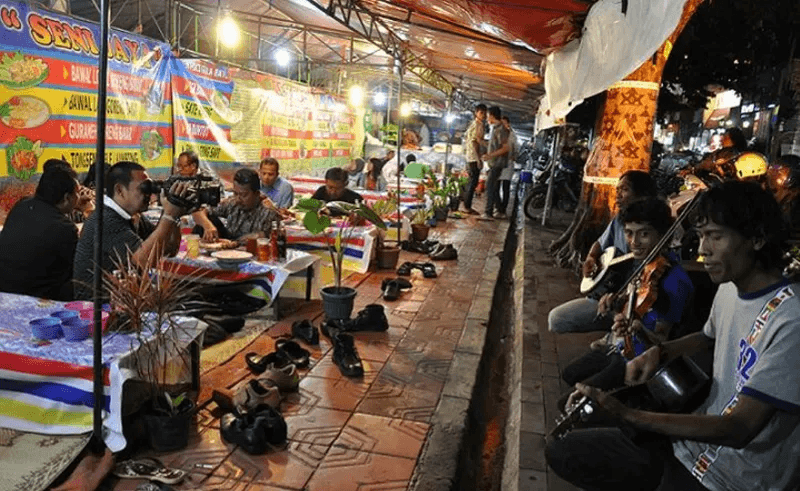
Furthermore, another unique dining experience available along Malioboro is the lesehan style dining arrangement where patrons gather around low bamboo mats for communal feasting. This immersive approach not only offers delicious meals but also fosters camaraderie among fellow diners as they share unforgettable moments over sumptuous traditional fare.
Those yearning for classic Javanese dishes presented elegantly should consider visiting traditional restaurants nestled within this bustling district. Here they will be treated to an assortment of timeless favorites crafted with precision and care.
Night Market Desserts and Snacks
Night markets in Yogyakarta are the perfect spots to savor a wide array of street foods and traditional desserts. These bustling hubs offer an authentic experience for visitors seeking to explore the local culinary scene. From savory delights like satay, noodles, and bakso to sweet treats such as gudeg and Klepon, there’s something to please every palate at these vibrant night markets.
Sweet Treats
At Yogyakarta’s night markets, one can indulge in an assortment of delectable sweet treats that showcase the rich flavors of Javanese desserts. For instance, Klepon is a popular choice among locals and tourists alike. These bite-sized rice cakes are filled with palm sugar and coated in grated coconut, offering a delightful burst of sweetness with every bite. Another must-try is Getuk Lindri, a colorful sweet cassava cake often shaped into unique forms that make it visually appealing while satisfying one’s sweet tooth.

Moreover, visitors shouldn’t miss out on trying Onde-onde, which are fried glutinous rice balls filled with mung bean paste. The crispy exterior combined with the gooey filling creates a delightful texture contrast that makes this dessert truly irresistible.
Savory Bites
For those craving hearty savory bites, Yogyakarta’s night markets have plenty to offer. One standout dish is Sate Klatak, featuring grilled skewered meat from Yogyakarta’s culinary heritage. The smoky aroma paired with tender meat makes this street food a favorite among locals and tourists alike.
Another flavorful option is Pecel Solo, which consists of mixed vegetables drenched in spicy peanut sauce served with rice – a tantalizing blend of textures and flavors that captures the essence of traditional Javanese cuisine perfectly.
Furthermore,Tiwul offers another savory delight made from cassava-based staple often paired with various accompaniments like fried tempeh or tofu – showcasing the versatility of traditional ingredients used in Indonesian cooking.
Vegetarian and Vegan Food Scene
Plant-based Restaurants
Yogyakarta boasts a vibrant vegetarian and vegan food scene, offering a diverse array of options for those seeking traditional Indonesian cuisine without meat. From innovative renditions of local classics to an emphasis on organic, locally sourced ingredients, plant-based eateries in Yogyakarta cater to the growing demand for vegetarian and vegan dining experiences.
Vegan-friendly restaurants in Yogyakarta are known for their creative use of tempeh and tofu as protein alternatives in traditional dishes. These establishments take pride in serving up delicious interpretations of classic Javanese delicacies while staying true to the essence of authentic flavors. By incorporating these plant-based proteins into popular street foods like tempe mendoan (battered fried tempeh) or tahu bacem (sweet marinated tofu), visitors can savor the rich culinary heritage of Yogyakarta while adhering to their dietary preferences.
Moreover, these plant-based restaurants place a strong focus on utilizing fresh vegetables and other natural ingredients, ensuring that diners enjoy wholesome meals that are both nutritious and satisfying. Whether it’s gado-gado (a mixed vegetable salad with peanut sauce), pecel (Javanese mixed vegetable salad with peanut dressing), or sayur lodeh (vegetable stew in coconut milk), visitors can indulge in an assortment of flavorful dishes that highlight the abundance of locally sourced produce available in Yogyakarta.
Street Food Options
Exploring the bustling streets of Yogyakarta unveils a colorful tapestry of enticing street food options catering to vegetarians and vegans alike. The city’s vibrant street food carts offer an extensive selection of delectable treats, ranging from savory snacks to delightful desserts—all free from meat products.
Visitors have the opportunity to sample traditional Javanese snacks such as bakwan jagung (corn fritters) or cilok (tapioca balls served with savory sauces) from friendly street vendors who take great pride in sharing their time-honored recipes with curious food enthusiasts.
Culinary Journey Through Yogyakarta
Must-Try Foods
When visiting Yogyakarta, there are several must-try foods that showcase the rich culinary heritage of the region. One such dish is Nasi Langgi, a complete meal featuring various Javanese side dishes like tempeh and fried chicken served with rice. Another delectable option is Sate Buntel, known for its unique minced meat wrapped around lemongrass sticks before being grilled to perfection. For those with a sweet tooth, Bakpia Pathok offers a delightful experience with its sweet green bean-filled pastries commonly enjoyed as snacks.
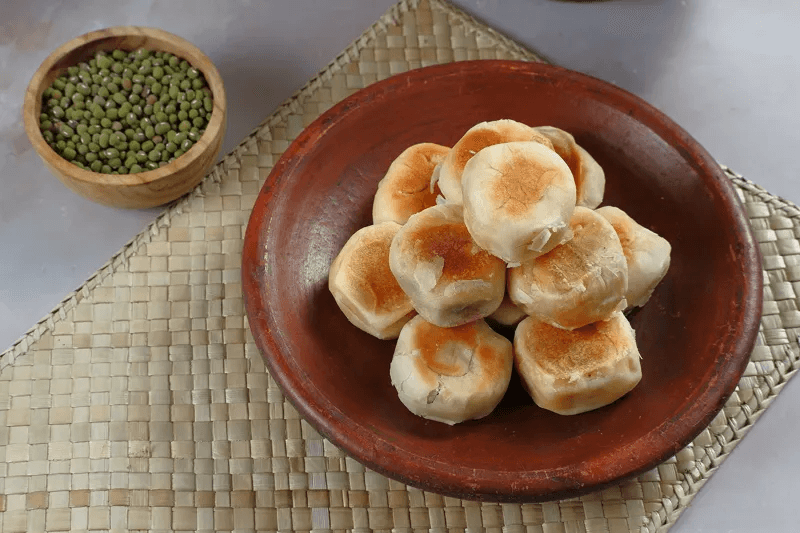
Traditional food in Yogyakarta isn’t just about satisfying hunger; it’s an opportunity to immerse oneself in the local culture and traditions through the flavors and aromas of authentic Indonesian cuisine.
Culinary Tours
Embarking on a culinary tour through Yogyakarta provides an immersive experience into the vibrant food scene of Central Java. These tours often include guided visits to traditional markets where visitors can explore popular street foods such as satay, gudeg, bakso, tempeh, and noodles. These tours offer insightful visits to family-owned food establishments for authentic experiences that go beyond mere dining.
One exciting aspect of these culinary tours is the interactive cooking classes offered by local experts. These classes showcase the art of preparing local delicacies while providing participants with hands-on experience in creating traditional dishes from scratch.
Exploring traditional markets and hidden culinary gems allows tourists to fully appreciate not only the diverse range of flavors but also gain insight into how integral food is within Indonesian culture.
Best Times for Food Enthusiasts to Visit
Seasonal Dishes
When planning a visit to Yogyakarta, consider the timing of your trip to savor seasonal dishes. During Ramadan, you can relish specialties like Ketupat and opor ayam served in local eateries and at festive gatherings. These traditional delicacies capture the essence of the holiday season and offer a unique culinary experience that reflects the local culture.
Moreover, keep an eye out for seasonal fruit offerings incorporated into desserts. Fruits like durian or mangoes are often featured in sweet treats during specific times of the year. The use of these fruits infuses desserts with vibrant flavors, adding an extra layer of authenticity to your dining experience.

Cultural celebrations or harvest festivals bring forth unique dishes, providing an opportunity to delve into lesser-known but equally delightful traditional foods. By aligning your visit with these events, you can partake in authentic cuisine that is deeply rooted in local customs and traditions.
Food Festivals
Yogyakarta hosts vibrant food festivals celebrating regional gastronomy throughout the year. These events showcase diverse traditional cuisines from different parts of Indonesia, offering visitors a chance to sample an array of delectable dishes under one roof. Immerse yourself in this culinary extravaganza as it presents opportunities not only for indulging in sumptuous meals but also for enjoying live music performances and engaging in various cultural activities.
Attending these food festivals allows you to explore Indonesian cuisine beyond what’s available on regular menus at restaurants and street vendors. You’ll encounter authentic recipes prepared by talented chefs who take pride in preserving their heritage through cooking techniques passed down through generations.
Conclusion: Embracing Yogyakarta’s Food Heritage
Shared Meals
Eating traditional foods in Yogyakarta is not just about satisfying hunger; it’s an opportunity to create lasting memories. Imagine sharing a table with locals and fellow travelers, savoring the rich flavors of gudeg, bakso, or tempeh. These shared meals become cherished moments that connect people through the universal language of food.
Heartwarming Stories
When you delve into Yogyakarta’s culinary scene, you’re not just tasting dishes; you’re discovering heartwarming stories behind family recipes and heirloom dishes. Each dish has a unique narrative – tales passed down through generations, preserving traditions and cultural heritage. From street vendors to local restaurants, every bite tells a story worth savoring.
Reflecting on the sensory journey of flavors that define Yogyakarta’s culinary landscape can be an enlightening experience for any food enthusiast. The fusion of spices in satay, the comforting warmth of noodles in savory broths, and the sweet indulgence of desserts made with palm sugar all contribute to a tapestry of tastes that encapsulate Central Java’s rich culinary heritage.
Summary
You’ve just completed a flavorful journey through Yogyakarta’s traditional cuisine. From exploring authentic Javanese dishes to discovering the top restaurants and street food culture, you’ve delved into the heart of the city’s food heritage. Embracing Yogyakarta’s culinary scene is not just about satisfying your taste buds; it’s a celebration of culture, history, and community.
As you plan your visit to Yogyakarta, get ready to immerse yourself in the rich tapestry of flavors and experiences that await you. Whether you’re a food enthusiast or simply curious about traditional Indonesian cuisine, this vibrant city has something special for everyone. So pack your sense of adventure and an empty stomach, and get ready to savor the authentic tastes of Yogyakarta!
Frequently Asked Questions
Where can I find the best traditional Javanese dishes in Yogyakarta?
You can experience the authentic flavors of traditional Javanese cuisine at Warung Handayani, Bale Raos, and Milas. These restaurants offer a wide range of classic dishes like Gudeg, Soto, and Ayam Goreng.
What are the must-try street foods in Yogyakarta?
Explore the vibrant street food culture in Yogyakarta by trying local favorites such as Angkringan delicacies, Bakpia Pathok pastries, and Wedang Ronde drinks. You’ll encounter a diverse array of flavors that truly represent the city’s culinary heritage.
Are there any recommended vegetarian or vegan dining options or popular street food in Yogyakarta?
Yogyakarta offers an emerging vegetarian and vegan food scene with places like Medit8 Vegan Kitchen & Bakery and Milas providing delicious plant-based dishes. These establishments cater to those seeking meat-free dining experiences while still savoring traditional Indonesian flavors.
When is the best time to visit Yogyakarta for food enthusiasts?
Plan your visit during cultural festivals like Sekaten or Ramadan to immerse yourself in special culinary events showcasing traditional delicacies. Consider visiting during off-peak hours to enjoy a more intimate dining experience at popular eateries.
How can visitors embrace Yogyakarta’s rich food heritage?
Embrace Yogyakarta’s food heritage by engaging with locals, participating in cooking classes or market tours, and supporting small businesses that preserve traditional recipes. By immersing yourself in the local culinary scene, you contribute to preserving this invaluable aspect of Javanese culture.


